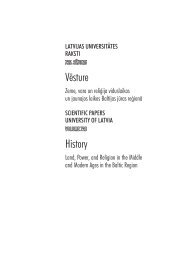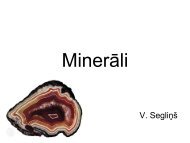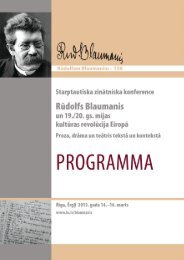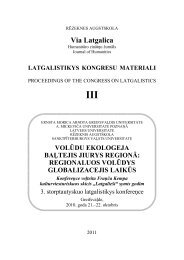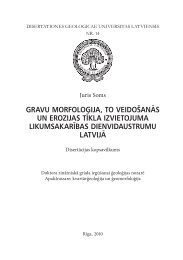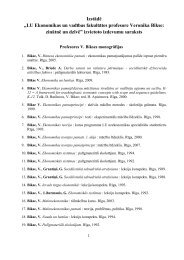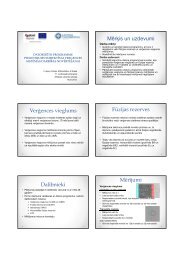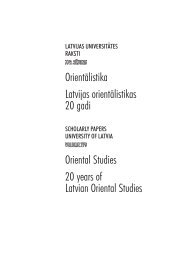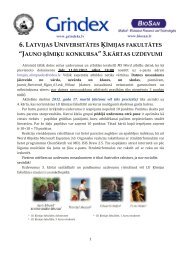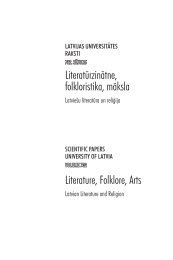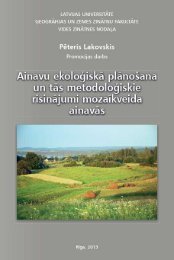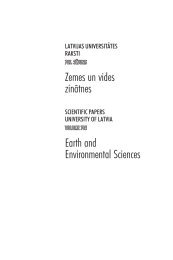Zemes un vides zinātnes Earth and Environment Sciences - Latvijas ...
Zemes un vides zinātnes Earth and Environment Sciences - Latvijas ...
Zemes un vides zinātnes Earth and Environment Sciences - Latvijas ...
Create successful ePaper yourself
Turn your PDF publications into a flip-book with our unique Google optimized e-Paper software.
10 ADVANCES IN PALAEOICHTHYOLOGY<br />
The Gross Symposium 2: Advances in<br />
Palaeoichthyology<br />
ERVĪNS LUKŠEVIČS <strong>and</strong> ĢIRTS STINKULIS<br />
Department of Geology, Faculty of Geographical <strong>and</strong> <strong>Earth</strong> <strong>Sciences</strong>, University of Latvia,<br />
Rainis Blvd 19, Riga, LV-1586; Ervins.Luksevics@lu.lv; Girts.Stinkulis@lu.lv.<br />
At the end of 2003 the comm<strong>un</strong>ity of palaeontologists celebrated centennial anniversary<br />
since has born outst<strong>and</strong>ing palaeozoologist Walter Robert Gross. His destiny has been<br />
characteristic for 20 th century being dynamic <strong>and</strong> changeable. W. Gross has been a<br />
citizen of several now extinct co<strong>un</strong>tries – born in Livl<strong>and</strong>, Russian Empire; lived in<br />
Weimar Republic, III Reich, Democratic Republic of Germany; long time has been a<br />
citizen of a new-born Republic of Latvia; during last period of his life became a citizen of<br />
Federative Germany (Schultze 1996). He has born in 20 th August of 1903, in Katlakalns,<br />
in family of Baltic German Lutheran pastor Ervin Johann Gross. From 1907 to 1918 the<br />
Gross family lived in Straupe, pastorate close to the Straupe Castle <strong>and</strong> Church. Beautiful<br />
nature in the vicinity of Straupe already in childhood has aroused a spirit of natural<br />
scientist in Walter’s soul. He has been interested in plants <strong>and</strong> animals, collected herbaria<br />
<strong>and</strong> observed birds. In his memoir W. Gross (1974) remembered that already 5 years old<br />
he decided to become a zoologist. In teenage years W. Gross started to interest about<br />
extinct animals, which fossils he has fo<strong>un</strong>d in outcrops at the Brasla River banks, <strong>and</strong> at<br />
age of 17 he already started to create serious palaeontological collections.<br />
Being very yo<strong>un</strong>g, in 1921, W. Gross entered the Naturforsher Vereins zu Riga. He<br />
has established contacts with the museum, <strong>and</strong> later he consigned to this museum his<br />
palaeontological materials, which are still kept at the Natural History Museum of Latvia<br />
(Lukševics 2002). After the military service in armed forces of Latvia he resettled to<br />
Germany, where has spent all the rest of his life, except shorter <strong>and</strong> longer journeys.<br />
Studies in the Marburg-am-Lane University followed, <strong>and</strong> he had to do a difficult<br />
choice between zoology <strong>and</strong> palaeontology, but in 1929 he needed to move to Berlin,<br />
where the studies continued in the A. Humboldt University. During study years, Gross<br />
continued to collect <strong>and</strong> study the Devonian vertebrate fossils from Gauja River <strong>and</strong> its<br />
tributaries. Based on the work on placoderm fish Asterolepis ornata (Gross 1931) the<br />
degree of Doctor of Philosophy was assigned to W. Gross in 1931; he became also a<br />
corresponding member of the Naturforscher Vereins zu Riga. Several important papers<br />
were written between 1931 <strong>and</strong> 1935, which were focused mostly on the Devonian<br />
fishes, mainly from the Baltic.<br />
Since 1936 Gross became a docent at Humboldt University, since 1943 an associate<br />
professor at the same <strong>un</strong>iversity (Schultze 1996). Also during this time he maintained<br />
contacts with Baltic geologists <strong>and</strong> the Naturforscher Vereins zu Riga administration;<br />
during this time several publications of Gross were issued on Estonian <strong>and</strong> Latvian<br />
placoderms, acanthodians <strong>and</strong> sarcopterygians (Gross 1940, 1941). In middle of the 2 nd<br />
World War professor Gross has been enrolled in the Reich Army, where he served <strong>un</strong>til<br />
the end of war; he was interned as prisoner of war, released in 1946. Only in 1949 W.<br />
Gross has returned to the Berlin, Humboldt University, where became a professor of



